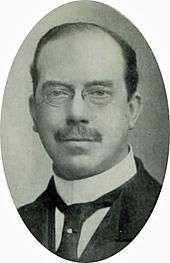Oswald Stoll
Sir Oswald Stoll (20 January 1866 – 9 January 1942) was an Australian-born British theatre manager and the co-founder of the Stoll Moss Group theatre company. He also owned Cricklewood Studios and film production company Stoll Pictures, which was one of the leading British studios of the Silent era.[1] In 1912, he founded the Royal Variety Performance (originally Royal Command Performance) a now-annual charity show which benefits the Entertainment Artistes' Benevolent Fund.

Biography
Early life
Born in Melbourne, Australia as Oswald Gray, he moved to England with his mother, Adelaide McConnell Gray after the death of his father James Oswald Gray. When his mother remarried, he took his stepfather's last name, Stoll.
Entertainment career
Theatre management

At a young age, Stoll left school to help his mother, Adelaide, manage first the Parthenon music hall in Liverpool, and later a regional theatre company. The company was a success, and Stoll began to buy or build city theatres. The theatre business made Stoll a wealthy man, and in 1898 he merged his business with that of competitor Edward Moss, to form Moss Empires. By 1905, almost every large town in Great Britain had an "Empire" or a "Coliseum" theatre, managed by Stoll. He continued to honour the roots of his business by installing his mother in each new box office, so she could take the first ticket sale.[2]
Royal Variety Performance
Beginning with the first event in 1912, and continuing until 1926, Stoll was instrumental in presenting the Royal Variety Performance (originally Royal Command Performance) a now-annual charity show benefiting the Entertainment Artistes' Benevolent Fund.
Film production
His film company Stoll Picture Productions was founded in April 1918,[3] and acquired a one-stage studio in Surbiton which the company retained until 1923.[4] A former aeroplane factory in Cricklewood was purchased in 1920 and converted to film use as Cricklewood Studios.[1] Particularly associated with director Maurice Elvey, Stoll's company maintained a connection with the film industry until 1938 when the Cricklewood studio was closed.
Theatre architecture
Stoll worked with the theatre architect Frank Matcham on several theatres, including:
- Nottingham Palace (1898).
- Hackney Empire (1901).
- London Coliseum (1904).
- Bristol Hippodrome (1912).
- Chiswick Empire (1912)
Sir Oswald Stoll Foundation
Stoll was a philanthropist who donated the land in 1916 for the Sir Oswald Stoll Foundation, a charity in Fulham, London for disabled soldiers returning from World War I and their families.[5] The foundation continues to house disabled ex-servicemen and women to this day, but also provides supported housing for veterans suffering from mental ill health, and those who, having left the Forces, have found themselves homeless.
Combat Veteran Players
From Stoll Foundation workshops designed to help veterans suffering from post traumatic stress through performing Shakespeare stemmed the Combat Veteran Players, or CVP. Since establishment they have performed with the RSC Open Stages programme, at the Old Vic Vaults, and Shakespeare's Globe. In 2014 they were awarded an inaugural Owle Schreame Award for innovation in historical theatre, for their production of Henry V.[6][7]
Personal life
Stoll married twice. He married his first wife, Harriet Lewis, in Cardiff in 1892, and they had one daughter. Harriet died in 1902, and Stoll married Millicent Shaw the following year. Oswald and Millicent Stoll had three sons. Lady Stoll became President of the Sir Oswald Stoll Foundation following her husband's death.
Stoll was knighted by King George V in 1919. He died in 1942 at his home in Putney, 33 Putney Hill.[8]
Bibliography
- The Grand Survival: A Theory of Immortality by Natural Law, London : Simpkin, Marshall & Co., 1904.
- The People's Credit. London : E. Nash, 1916.
- Freedom in Finance. London : T.F. Unwin, 1918.
- "Broadsheets" on National Finance. London : W.J. Roberts, 1921.
- More "broadsheets" on the National Finance. London : W.J. Roberts, 1922.
- National Productive Credit. London : George Allen & Unwin, 1933.
For an analysis of Stoll's writings see Vincent Barnett, 'A Creditable Performance? Sir Oswald Stoll as Business Strategist and Monetary Heretic', Journal of the History of Economic Thought, September 2009.
Notes
- Patricia Warren British Film Studios: An Illustrated History, London: B.T. Batsford, 2001, p.22
- Felix Barker, The House that Stoll Built, 1957.
- Brian McFarlane The Encyclopedia of British Film, London: Methuen/BFI, 2003, p.641
- Patricia Warren British Film Studios: An Illustrated History, London: B.T. Batsford, 2001, p.160
- Welcome to the SOSF (Sir Oswald Stoll Foundation)
- Loxton, Howard The Owle Schreame Awards for Innovation in Classical Theatre: Combat Veteran Players, "British Theatre Guide", September 19th (2014)
- "Archived copy". Archived from the original on 2015-04-02. Retrieved 2015-03-11.CS1 maint: archived copy as title (link)
- The Putney Society (2010). The Bulletin, December. p2.
References
- "Sir Oswald Stoll, producer, is dead". The New York Times. January 10, 1942. p. 18. Retrieved 2 November 2009. (Subscription required.)
- R. W. E. (April 5, 1952). "Successful entrepreneur, Melbourne-born Sir Oswald Stoll". The Age. Retrieved 2 November 2009.